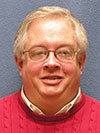Faith and Family / Sean Gallagher
Learning starts
early in life and
is directed ultimately
toward God
 It’s been interesting watching our little son, Colin, start to grow and change since he was born on Sept. 9.
It’s been interesting watching our little son, Colin, start to grow and change since he was born on Sept. 9.
At first, he kept his eyes closed most of the time. He did that in part because it took his eyes a while to get adjusted to the bright world into which he was born. Before Sept. 9, all he ever knew was the darkness of Cindy’s womb.
But now, his eyes are used to the brightness around him, and he keeps his eyes open more of the time. When they’re wide open, they seem so large on his little face.
It’s been fascinating watching him slowly take in the world that surrounds him through his eyes. He seems so intent on whatever he’s looking at that he could surely win a staring contest. Of course, I like it best of all when the object of his observations is me, his mother or his brothers. He seems to like it, too, because he’s started to smile a bit after looking at us—a beautiful moment that could melt even the hardest of hearts.
Right now, Colin’s senses are basically the only way he can learn about the world. He can’t move around on his own to wherever he would like to go. He can’t ask questions or read. But he can see, feel, listen and smell. He can’t even taste that much yet, as all he is taking in for nourishment is Cindy’s breast milk.
Be that as it may, his exploration of the world seems to be starting in earnest. And I hope that it’s a journey that won’t end until his dying breath. That’s because this desire to learn is at the heart of what it means to be a human being.
In and of itself, this desire to learn is a good thing. Through it, we can order our lives according to what is good, true and beautiful and help other people do the same, thus improving the broader world in which we live.
The human drive to learn shows something deeper in us. It reveals in us a desire to go beyond ourselves, to learn about our world and other people. And as we take in this universe beyond ourselves, we discover the power of this desire and that it cannot be satisfied by anything in this world or even by the universe as a whole.
This finally suggests the ultimate goal of our desires—God himself. St. Augustine famously wrote about this some 1,700 years ago in a prayer to God at the start of his spiritual autobiography, The Confessions: “You have made us for yourself, and our hearts are restless until they rest in you.”
This seems like a lot to discern from the simple observations of a newborn baby. But Colin’s life is simple right now. Unlike us adults, he hasn’t cluttered his life with lots of things that distract us from what is really important. And what is at the heart of our human nature can be more clearly seen in babies like him.
Maybe that’s a reason why we Catholics choose to baptize our babies into the life of grace that God in his mercy offers to all of us.
When little Colin was baptized on Oct. 13 by his second cousin, Father Peter Gallagher, my hope was that the grace he received in this sacrament will help him along his lifelong path of learning. As he takes one step after another on this journey, I hope that the grace of his baptism will especially draw him daily into a closer relationship with God in which he knows God and himself more and more.
I have this desire for him because I believe it is for his good here and now and for his ultimate good. And this can only lead him to do good for those around him. If this is true for Colin, then it’s also true for all of us.
May God’s grace keep alive in us our desire to learn about ourselves, our world and especially him and his will for us. †
 It’s been interesting watching our little son, Colin, start to grow and change since he was born on Sept. 9.
It’s been interesting watching our little son, Colin, start to grow and change since he was born on Sept. 9.